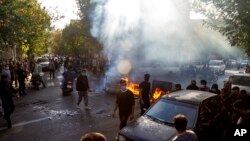The U.N. Human Rights Office is calling on Iranian authorities to immediately release thousands of peaceful protestors from detention and to drop all charges against them.
Nationwide protests sparked by the death of 22-year-old Mahsa Amini on September 16 while in police custody show no sign of going away.
Amini was arrested three days earlier by Iran’s morality police for the alleged improper wearing of the hijab. That event unleashed demonstrations of public anger against the regime not seen since 2019.
Observers say more than 14,000 peaceful protesters have been arrested. Last week, Iran’s prosecutor said more than 1,000 indictments had been issued against those arrested in Tehran province alone.
U.N. human rights spokesman Jeremy Laurence says hundreds of other indictments have been issued in the rest of the country.
“Human rights law protects the rights of people to peaceful assembly and to freedom of expression," Laurence said. "Instead of opening space for dialogue on legitimate grievances, the authorities are responding to unprecedented protests with increasing harshness.”
Civil society organizations monitoring events in Iran report excessive force by security forces has led – as of Wednesday - to the deaths of 326 individuals including 43 children and 25 women.
Speaking on behalf of U.N. human rights officials, Laurence urges Iran to end its harsh crackdown on peaceful protesters, to immediately release all those in detention, and to drop charges against them.
He condemns the decision by Iran’s Revolutionary Court Sunday to sentence an unidentified protester to death for allegedly damaging public property. He says at least nine other protesters have been charged with offenses that carry the death penalty.
“Under international law, countries that have not yet abolished the death penalty may only impose it for the “most serious crimes,” which is interpreted as crimes of extreme gravity, involving intentional killing," Laurence said.
The U.N. human rights office is calling on the Iranian authorities to immediately impose a moratorium on the death penalty and to revoke death sentences issued for crimes that do not quality as the most serious crimes.
Laurence says his office is in contact with the Iranian authorities and has been in communication regarding the investigations they have carried out into Mahsa Amini’s death.
A statement issued Friday by Iran’s forensic organization concluded that “Mahsa Amini’s death was not caused by blows to the head and vital organ and limbs of the body.” This contradicts claims made by her parents that Amini died of “a violent blow to the head” by police officers.




